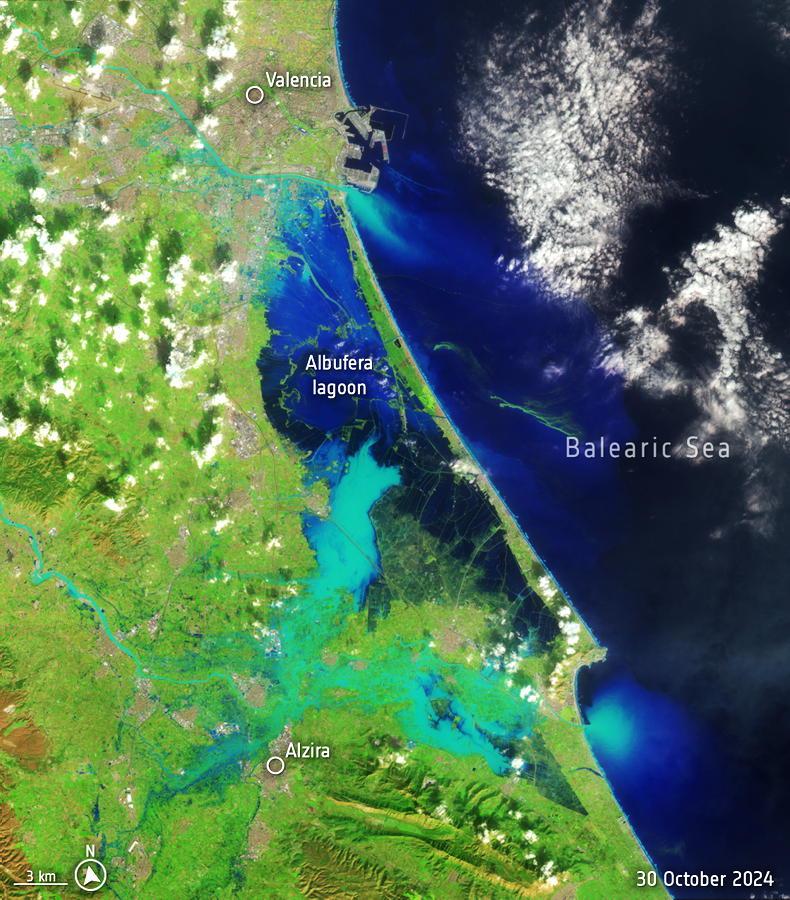Spanish farmers are dealing with the aftermath of devastating flooding in the province of Valencia last week, after a storm brought a year’s worth of rain in eight hours.
Over 200 people have been killed and vast swathes of farmland flooded.
Spanish farm organisation, Asociación Agraria Jóvenes Agricultores (ASAJA), said the survival of animals on livestock farms is a priority for the agricultural sector at present.
Access to farms
The young farmers’ association, Spain’s largest farm organisation, said the Spanish Ministry of Agriculture estimates that 2,950 animal carcases have already been removed from 17 pig, sheep, equine and poultry farms impacted by the flooding.
Its Valencian branch, alongside other farm organisations and the Spanish Ministry for Agriculture, are working “against the clock” to repair roads to access farms.
President of the ASAJA Valencian branch, Cristóbal Aguado, said the torrential rain destroyed access to many farms.
“In the most serious cases [the storm] flooded the facilities, spoiling fodder, feed, drinking water and even causing the death of livestock.
“Some associates warned us that if we could not reach the farms to feed and water the animals in a few days, they would not survive and, for this reason, we have all got to work to prevent the disaster from being much greater,” Aguado said.
Fruit and veg
The storm has also wreaked havoc on Spain’s fruit production.
Valencia accounts for two-thirds of Spain’s citrus fruit, with much of this land flooded.
Tesco Ireland said it expects to see some impact on supply over the coming weeks on citrus fruits from the region, with plans to replace this deficit with supplies from other areas.
Meanwhile, Lidl said it has “not experienced any significant availability issues” with fruit and vegetable supplies currently.

Before image of the flooding in Valencia. \ US Geological Survey (USGS)

After image of the flooding in Valencia. \ US Geological Survey (USGS)
Spanish farmers are dealing with the aftermath of devastating flooding in the province of Valencia last week, after a storm brought a year’s worth of rain in eight hours.
Over 200 people have been killed and vast swathes of farmland flooded.
Spanish farm organisation, Asociación Agraria Jóvenes Agricultores (ASAJA), said the survival of animals on livestock farms is a priority for the agricultural sector at present.
Access to farms
The young farmers’ association, Spain’s largest farm organisation, said the Spanish Ministry of Agriculture estimates that 2,950 animal carcases have already been removed from 17 pig, sheep, equine and poultry farms impacted by the flooding.
Its Valencian branch, alongside other farm organisations and the Spanish Ministry for Agriculture, are working “against the clock” to repair roads to access farms.
President of the ASAJA Valencian branch, Cristóbal Aguado, said the torrential rain destroyed access to many farms.
“In the most serious cases [the storm] flooded the facilities, spoiling fodder, feed, drinking water and even causing the death of livestock.
“Some associates warned us that if we could not reach the farms to feed and water the animals in a few days, they would not survive and, for this reason, we have all got to work to prevent the disaster from being much greater,” Aguado said.
Fruit and veg
The storm has also wreaked havoc on Spain’s fruit production.
Valencia accounts for two-thirds of Spain’s citrus fruit, with much of this land flooded.
Tesco Ireland said it expects to see some impact on supply over the coming weeks on citrus fruits from the region, with plans to replace this deficit with supplies from other areas.
Meanwhile, Lidl said it has “not experienced any significant availability issues” with fruit and vegetable supplies currently.

Before image of the flooding in Valencia. \ US Geological Survey (USGS)

After image of the flooding in Valencia. \ US Geological Survey (USGS)








 This is a subscriber-only article
This is a subscriber-only article










SHARING OPTIONS: